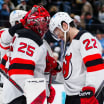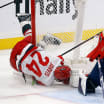Makar enters season with Avalanche as student of game
Rookie defenseman well schooled in psychology on ice, in classroom
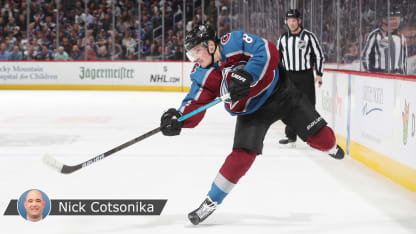
© Getty Images
On Friday, April 12, he won the Hobey Baker Award, voted as the top player in NCAA men's hockey. That Saturday, the sophomore defenseman played for the University of Massachusetts Amherst in the NCAA Division I final in Buffalo.
That Sunday, he signed a three-year, entry-level contract with the Colorado Avalanche. That Monday, he made his NHL debut in Denver, scoring on his first shot in a 6-2 win against his hometown team, the Calgary Flames, in Game 3 of the Western Conference First Round.
CGY@COL, Gm3: Makar scores in NHL debut
Now it was Tuesday, and he had a book report due Wednesday.
"He emailed me Tuesday morning," said Richard Halgin, his professor. "'Doc, it's been a busy week. Can I have a few days' extension?' That is the kind of guy he is. And he was serious. It wasn't a joke.
"And he sent the book report."
It was on "The Power of Onlyness: Make Your Wild Ideas Mighty Enough to Dent the World" by Nilofer Merchant, a business thinker who wrote that the internet allows ideas to spread through networks now instead of hierarchies. Power is not determined by status but "onlyness," your unique position, a function of your distinct history, experiences, visions and hopes.
The class was an independent study course called Psychology of Self-Understanding.
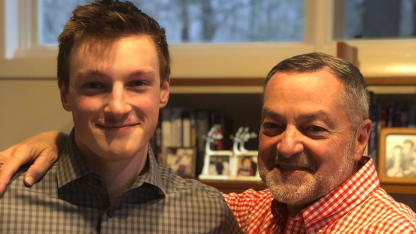
Avalanche defenseman Cale Makar with his professor, Richard Halgin
All of this is key to understanding Makar as he enters his first full NHL season.
Makar hasn't played a regular-season NHL game yet and doesn't turn 21 until Oct. 30, but he will play a large role for the Avalanche and face sky-high expectations as a leading candidate for the Calder Trophy as rookie of the year.
Opponents will know of, and plan for, him as they do few rookies. Asked about the Avalanche, Chicago Blackhawks forward Patrick Kane started by mentioning "that Makar."
How will Makar handle the pressure? The ups and downs? The praise and criticism?
"Nobody can make you feel good, bad, happy, sad, unless you let them," said his father, Gary. "And if you've got that as sort of a foundation, it kind of gives you your superpower, you know, to be able to handle things."
Makar has been taught the mental side of the game since he started playing. His education continued in college and will continue in the NHL. He has to be one of the rare rookies to say something like this:
"In college, you don't have much free time with school and stuff," said Makar, who completed his work for the semester after the Stanley Cup Playoffs and plans to graduate someday. "So now, with a little bit more free time, hopefully I'll be able to kind of look at that side more again and do a lot more reading."
You've got to read more about him. He has a chance to make a dent in the hockey world because of his "onlyness."
"He is amazing," said Halgin, a professor of psychology and faculty mentor to the hockey program at Amherst. "I've taught 20,000 students at UMass, I've worked with the hockey team for 25 years and he literally stands out as the most exceptional, certainly the most exceptional hockey player, that I've ever advised for his maturity, his work ethic, his thoughtfulness and his conscientiousness in so many ways."
* * * * *
Gary majored in marketing and minored in psychology at the University of Calgary. His junior year, he did a marketing project for the Calgary Stampeders of the Canadian Football League. That turned into a part-time job assisting in marketing and public relations. He got to spend the season with them.
The Stampeders had an accomplished kicker, J.T. Hay, who was cool under pressure. Hay would say it didn't matter whether it was the first quarter or the final second, whether the crowd was cheering or booing. It was just him and the ball. All he had to do was kick it.
Gary describes himself as a nerd when it comes to personal responsibility and development. He started coaching hockey even before he and his wife, Laura, had their sons, Cale and Taylor. He coached their sons from about ages 5 to 12.
Each season, the coaches would start with an exercise, telling the kids to pair up and find some pressure. The kids would look around and come up empty.
"The whole lesson is, 'Well, what's pressure?'" Gary said. "You can't touch it. You can't taste it. You can't feel it. You can't see it."
If a kid said you could hear it, Gary would respond, "No, that's the crowd."
"The whole world will try to tell you it's a pressure situation, but it is what you make it," Gary said. "I think over and over, just repeating that, it starts to get … It's the foundation. You control your own thoughts. The five most useless words are, 'What do other people think?' It doesn't matter. ...
"You can always reframe something that's there. There's 15,000 fans, and you can skate out and go, 'Oh, my God. What if I screw up?' And that's a mindset. But you can skate out and go, 'There's 15,000 fans. What an opportunity for me to make an impression.'"
Once, when Cale was about 9 and Taylor about 7, Saul Miller came to speak to their youth hockey association. Miller is a mental coach who has worked with elite athletes across the spectrum. One of his books is "Hockey Tough," which teaches that the best players aren't just gifted. They're mentally tough. Miller signed books for Cale and Taylor.
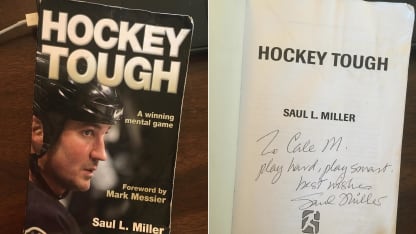
Gary still has them.
Gary has had Cale and Taylor keep an all-caps quote with them as a reminder: "LOOK IN THE MIRROR. THAT'S YOUR COMPETITION." Another favorite quote: "Point the finger, and three come back at you."
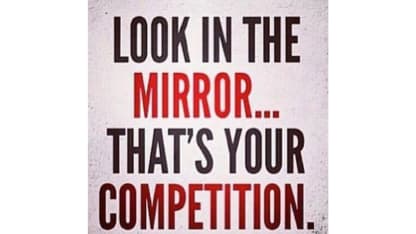
"You try to impart among these guys that they really are responsible for the way they react to anything," Gary said. "It's the one thing that you can always control, the way you react to stuff. From a young age, it's always just harped on. ...
"My whole philosophy of coaching is, you start with the mind, because that's your biggest tool. The mind makes you realize that you can do things. You can get self-esteem, which leads to confidence, which leads to fun."
These were more than hockey lessons. They were life lessons.
Cale cut lawns as a kid to earn money. Three summers in a row, he got up at 5:30 a.m. and rode the bus every day for two weeks to serve beef on a bun at the Calgary Stampede, the annual rodeo, exhibition and festival.
"You don't go out thinking you're going to be a pro hockey player," Gary said. "And you'd better get some perspective and realize that everyone on the planet's working somehow."
By the time Cale arrived in Amherst, he was already well schooled.
"I think a big reason why he's a very good player is he's always been a very emotionally mature kid," UMass coach Greg Carvel said. "He's had the huge advantage of having a father who has taught him his entire life the importance of process and being in the now and emotional stability, all those intangibles.
"He's an extremely humble kid too. I think kids who have that asset or personality trait, they understand that, 'OK, I'm a good player, but I'm very grateful for what people do for me. It's not about me. Yes, I'm a very good hockey player. I'm very thankful and appreciative of that. But that doesn't define me.' He's a good person beyond being a good hockey player."
* * * * *
Cale took Halgin's class on abnormal psychology as a freshman. Even though it started at 8:30 a.m., the No. 4 pick in the 2017 NHL Draft was always there, sitting in the second row.
"Never acted like the big man on campus," Halgin said. "And, of course, he was the most famous guy on this whole campus among the students."
Canada was interested in using Makar as a power-play specialist for the 2018 PyeongChang Olympics, but he thought it was better for his development to play big minutes in all situations for UMass.
After he had 21 points (five goals, 16 assists) in 34 games as a freshman, the Avalanche wanted him to turn pro, but he thought he needed to work on his strength and stamina.
"He was not swayed by anyone," Carvel said. "He had a very sound understanding of what he was capable of doing and where he needed to get better."
Makar enjoyed Halgin's class so much that he asked to do an independent study course his first semester as a sophomore. The course was Psychology of Leadership. He had to read six books, write a report on each, meet with Halgin for an hour each week and write a term paper of at least 12 pages.
One book was "Mindset: The New Psychology of Success" by Carol Dweck, a Stanford University psychologist who wrote that success in almost every endeavor can be dramatically influenced by how we think about our talents and abilities. People who have a fixed mindset, believing abilities are fixed, are less likely to flourish than those with a growth mindset, believing abilities can be developed.
Another was "Grit: The Power of Passion and Perseverance" by Angela Duckworth, a psychology professor at the University of Pennsylvania who wrote that success is not driven by genius but by a unique combination of passion and long-term perseverance.
Makar asked to do another independent study course his second semester. That was Psychology of Self-Understanding. Same requirements.
He never missed a meeting with Halgin, at least until he joined the Avalanche -- even one morning when school was closed.
"I figured, 'Maybe he'll feel he doesn't have to come,'" Halgin said. "Ten to 8, he knocks at the door. He walked one mile in the snow from his dorm. … Without even blinking."
Sometimes Halgin and Makar would talk hockey. Halgin encouraged him to speak up as an alternate captain. Once, after Makar barked at a freshman on the bench for making a mistake in a game, he apologized, because that's not the way he acts.
"There was one game we lost, and we should have won it," Halgin said. "I met with him a few days after. I said, 'Cale, what do you think went wrong?' He said, 'That was my fault.' He said, 'I often set the pace for the team, and I was a little off, and I take responsibility for it.' There were other players on the ice, but he never, ever pointed a finger at anyone else."
Makar became the fourth sophomore and eighth defenseman to win the Hobey Baker since the award's inception in 1981. UMass lost the NCAA final 3-0 to Minnesota Duluth, but it was the school's first title game, a huge accomplishment. Makar finished with 49 points (16 goals, 33 assists) in 41 games, third in the nation and first among defensemen in Division I.
"I think the two years at UMass were a very good transition, particularly last year," Carvel said. "Everybody knew his name. Every game, he knew everybody was watching him. He knew everybody was trying to check him.
"He revived a hockey program, and he'd be the first one to say, 'Hey, hey. It wasn't me. We did this together. I have a tremendous group of teammates, friends. This is a complete team effort.' And he never, ever, ever wanted to talk about the NHL when he was here. It was kind of taboo. This is a kid who was taught by his parents how important it is to be in the now, and he was also very self-aware."
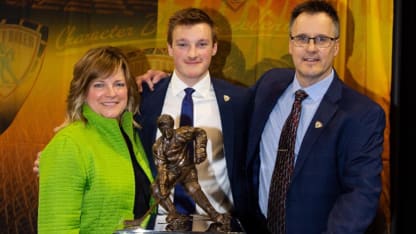
Cale Makar with his family after receiving the Hobey Baker Award
The Monday before UMass left for the Frozen Four in Buffalo, Halgin had a farewell dinner for Makar at his home. Makar and some teammates brought Halgin gifts and a signed thank-you card.
Halgin still has the card.
"It's more than just skill on the ice," Halgin said. "If he never played another game of hockey, he would still be an amazing human being, because he's the real deal in every way. He's the kind of guy that you would want your daughter to marry, the kind of person you'd want to have as your friend. He just brings such integrity and such work ethic and such kindness about him. He's a very kind person. ...
"I just can't wait to see his star shine."
* * * * *
Makar jumped into the NHL at the most pressure-packed time of year, at the highest level, in front of sellout crowds. He played a game at Scotiabank Saddledome, where he used to root for the Flames and near where he used to sell beef on a bun at the Stampede.
What an opportunity for him to make an impression.
He had six points (one goal, five assists) in 10 games. At the Stampede over the summer, he was a celebrity. His former employer gave him a free sandwich.
"When he came into playoffs, for him it was just another game," Avalanche development coach Brett Clark said. "He didn't look at it as the NHL. He just went out there. As you've seen, he's a spectacular player. He does stuff we could only imagine to do. His explosiveness and passing ability and his shiftiness along the blue line, that's what makes him so special."
The funny part is that Makar said the systems were new and he didn't fully understand what was going on, especially in the defensive zone.
"Looking back on it, I wasn't really there," Makar said. "I was just kind of blacked out the whole time and just kind of went with the flow. Everything just happened so fast, you've kind of just got to stay with it."
Clark laughed at that.
"That shows you what kind of head on the shoulders he has and how quick he can adapt to whatever the game throws at him," said Clark, an NHL defenseman from 1997-2013 who has worked closely with Makar since he was drafted. "He's such a down-to-earth kid. That's why you sort of love that comment and you sort of chuckle."
Carvel, who was an assistant with the Mighty Ducks of Anaheim in 2003-04 and the Ottawa Senators from 2004-11, had been saying all season Makar skated like Edmonton Oilers center Connor McDavid, even when others thought that was an aggressive compliment.
"I continually got asked all summer long, 'Man, could you believe how well Cale played?'" Carvel said. "And I was like, 'Yes.'"
Now Makar, who played through knee tendinitis last season, has had an offseason to rehab and train. He will learn the nuances of the NHL, like defensive-zone coverage and where the line is physically. Carvel said he thinks Makar will surprise people with his physical play.
Clark has noticed a difference already in training camp and the preseason.
"He looks outstanding out there from what I see and even compared to the year before," Clark said. "He's even a step faster. Decision-making's quicker. He's just more confident, because, you know, he's played in the situation."
The biggest question is how Makar will adapt to the 82-game grind. Carvel said it will be interesting to see how Makar feels after about 40 games, or the length of a college season. Carvel said he doesn't think he will be drained emotionally, but it might be an adjustment physically.
Ultimately, the experience -- good, bad or in between -- will be what Makar makes it, with help from his support system.
"It's going to be a growth experience for him," Halgin said. "It's not going to be easy. And I would expect that he and I are probably going to talk during the year."
Last Sunday, the Avalanche selected Makar for the shootout in a preseason game against the Minnesota Wild. In front of his coaches, teammates and home fans, he skated out all alone and …
Fumbled the puck.
He called his parents as he does after each game. Pieced together from an interview with Gary, the conversation went something like this:
"How you doing, bud?" his father asked.
"Oh, God," Cale said. "You know how cool that is to take a penalty shot? My first one, and I don't even get a shot away? That was the most embarrassing thing."
"Only if you let it."
"I know."
"Well, what did you learn?"
"I was trying to go too fast."
"Great."
"But I probably won't get asked again!"
"Well, you can't control that, can you? Do it in practice. Just be ready next time in case you're called, because that's all you can do."
"Yeah."
They ended up laughing about it.
"I can't even imagine as a dad the type of pressures and stuff in this environment," Gary said. "Young guy, and all these superstars and stuff. But at the end of the day, it's as big and scary as you let it.
"At the end of the day, it's you and the guy in the mirror, eh?"

